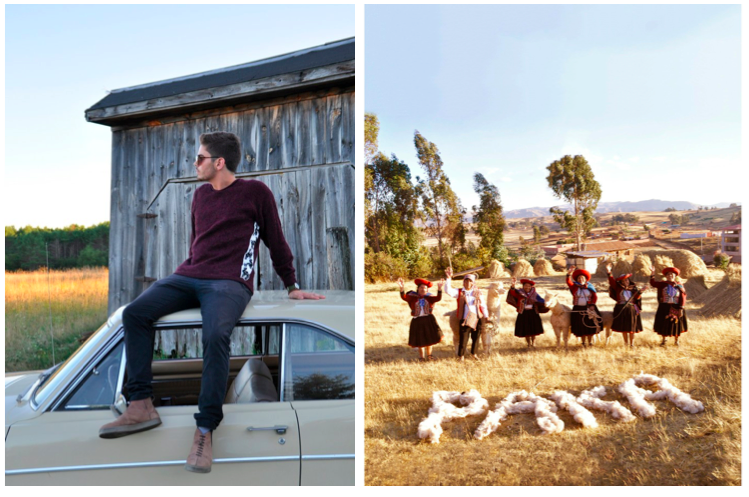When hearing someone throw together the notion of ‘surfers,’ ‘alpacas,’ and ‘grandmothers,’ your first thought might be that you must have stumbled into a particularly esoteric game of Apples to Apples. However, just as the winning combinations of words in that dependable game prove, there can be a good bit of magic in unexpected fusions or would-be contradictions. For PAKA founder Kris Cody, a magical discovery – bringing together the aforementioned terms – occurred during a gap year between high school and college, during which he traveled across a number of places in South America. “I was so blown away by South America and how open and warm-hearted the people were,” he shares. And the discoveries he made during his travels ultimately led him to his two subsequent paths of focus (about as different as the words referenced above): neuroscience and apparel, specifically PAKA’s alpaca wool sweaters that count college kids and celebrities alike in their growing fan base (The Chainsmokers wore a PAKA piece in Amsterdam during their recent tour). As for neuroscience, a short-term gig working with monkeys at an animal refuge in Bolivia, combined with a nod to his family’s long line of doctors, sparked his interest in that subject, which he’s now studying at UVA.
But the PAKA path emerged from a single day’s encounter – walking through an artisan market in Cusco where a “grandmother” was selling a beautiful, eye-catching alpaca wool sweater. After buying and wearing the sweater throughout his travels, he discovered that the unique nature of the wool – “it’s a hollow fiber that’s super insulating in the cold, but you can also wear it in 70 degree weather” – and the sweater’s durability made it perfect for his active surfer lifestyle. “Alpaca wool is just not very prevalent in the United States,” he tells me, so when he got back to the US and started school at UVA, he attracted quite a bit of attention, with fellow students eager to know where he got this distinctive garment. To someone else in Cody’s shoes, this may have been simply an opportunity to brag about a cool South American adventure, reveling in the exclusivity of the fabric warming his shoulders, but for Kris, it struck him as a business opportunity and a chance to create and share a specially blended culture.
This culture PAKA is creating doesn’t simply involve bringing Peruvian-inspired gear to US college kids, however – it’s fueled by an ongoing relationship with local Cusco weavers who create these garments as their calling and their passion. He was so struck by his interaction in the market with these skilled women that he kept pondering it long after he had left, eventually feeling compelled to return the following year. “I was thinking: how could I blend my 21st Century world with their world? I saw the potential, and I bought a one-way ticket to go back to Cusco by myself last summer.”
He admits that this leap of faith, at first, was a lonely one. Nevertheless, he approached and forged a tentative relationship with these weavers during his first few days in town. “I had them write down their names on pieces of paper,” he remembers, as he continued refining his Spanish skills to navigate the language barrier between them. Once he broke the cultural/generational ice, “they were so pumped” about the potential that this idea held. Soon enough, he had a whole team of enthusiastic weavers and a community that embraced him – “we created designs together; I’d go over in the morning and make eggs for their kids.” Ultimately, he sees this growing partnership as integral to PAKA’s core values. “Globalization is allowing us to create potential for these women who have such talent…to create a positive impact on their lives was huge for me.”
Similarly, the care and quality standards that Cody and his team put into every sweater are of the utmost importance. Out of all the growth, celebrity fans, and glamorous travel stories he could spout, he tells me that the statistic he’s most proud of is his truly miniscule proportion of returned items, underscoring a happy customer base who get good use out of these stylish, durable pieces. Again, he credits this back to the women he works with in Peru. “Their weaving style has been passed down from the Incas over thousands of years; they’ve refined the alpaca wool as a luxurious fiber,” Cody shares. This surfing neuroscience major may be an unexpected conduit to bring larger awareness and appreciation for this respected tradition in the United States, but it goes to show that you never really know when a bit of magic is going to strike.

